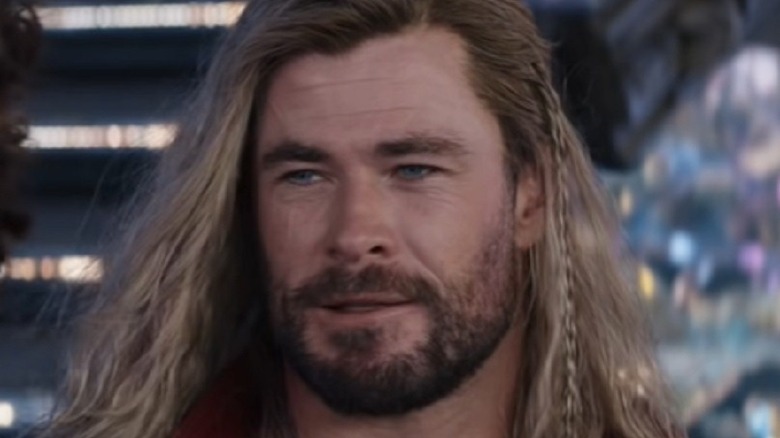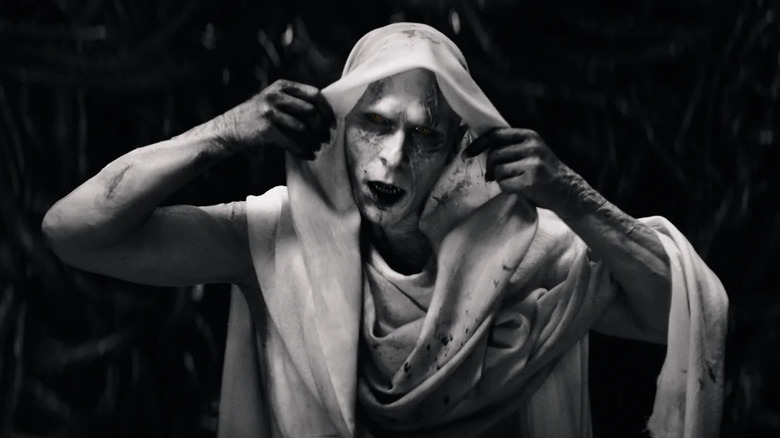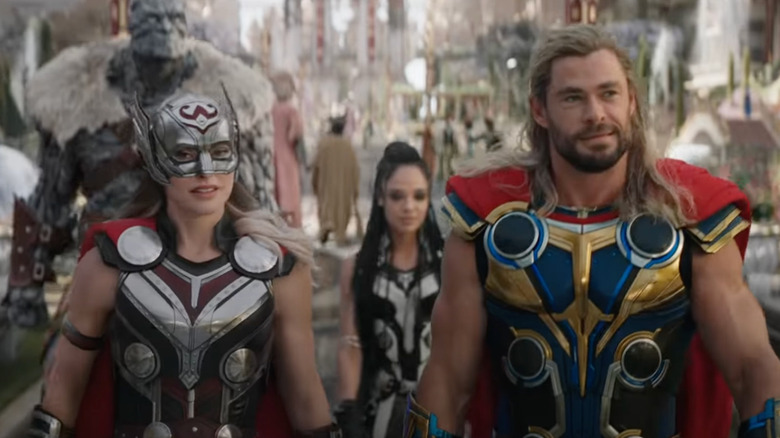Thor: Love And Thunder Review: It Ragnaroks
- A wild, thrilling, lol Thor adventure
- Keeps the "Ragnarok" vibe strong
- Bale is the best Marvel villain since Thanos
- Doesn't develop the MCU much, if at all
There's a recurring narrative device in "Thor: Love and Thunder" that has Korg (voiced by writer/director/actor Taika Waititi) telling mythical tales of the mighty space Viking throughout the ages. Of course, this being a narration from Thor's rocky, goofy pal, much of it is tongue-in-cheek and played for laughs — but while you're experiencing it, it's hard to not reflect on all the adventures MCU film viewers have shared with the Asgardian god. We've seen him Shakespearean and somber, Earth-curious and in love, long hair and short, joining the Avengers and the Guardians of the Galaxy, losing an eye, reduced to a "Big Lebowski" bod, bouncing from clinical depression to Waititi-fueled "Ragnarok" glee, gaining friends and losing others, losing a signature weapon and gaining another — all of which has led to him becoming the first Marvel MCU character to get a fourth solo film.
You probably could've landed good odds after the first movie (or even better after "Thor: The Dark World," still considered by many to be the worst MCU outing) on betting that Chris Hemsworth's Thor would outlast Robert Downey Jr.'s Iron Man, Chris Evans' Captain America, and others. But thanks in large part to a late infusion of personality from Waititi's distinctive style, Thor has never felt more fresh, invigorating, and ripe with creative possibility. While "Love and Thunder" isn't as good as "Ragnarok," it very much feels like a continuation of that masterpiece, and future generations might remember the pre-Waititi films as a reverse of how we regard non-Tim Burton '90s "Batman" films: stray sparks here and there, indicative of what a master filmmaker did far better.
With big laughs throughout, adrenaline-pumping action scenes, and Christian Bale as the best MCU movie villain since Thanos, "Love and Thunder" pairs nicely with "Doctor Strange in the Multiverse of Madness" and "Spider-Man: No Way Home" to reflect a Marvel universe now freed from the shackles of origin tales and audiences still needing the characters explained. These are full-on, mind-blowing movies, unafraid to swing for the fences with big ideas. The worst thing you can say about this one? The post-credits scenes are lame.
Boy in the hood
"Love and Thunder" kicks off catching us up on the big blonde dude, who has returned from "dad bod to god bod" by pulling spaceships and lifting mountains. New Asgard has become a tourist trap, filled with docked ocean liners and Thanos-themed ice cream shops, and Thor is introduced on a particularly fun adventure alongside the Guardians, making it all about himself as he Jean-Claude Van Damme a split between two oncoming space vehicles.
Marking a stark contrast, we then catch up with ex-girlfriend Jane Foster (Natalie Portman), who has late-stage cancer. She's been successful enough to reach the point where she catches random strangers reading her books about space travel and wormhole theories, but she is in full denial about the fact that her days are numbered, as demonstrated by brief cameos from somber friends Darcy (Kat Dennings) and Erik Selvig (Stellan Skarsgard). Much of this has been in the pages of Marvel Comics, yet the way Jane comes to believe Thor's old hammer Mjolnir could be her salvation, then travels to New Asgard, is abridged and confused; regardless, the storyline is no less powerful.
Meanwhile, the film brings us Gorr the God Butcher (Bale), a fascinating and somewhat sympathetic villain driven by the death of his daughter, the result of his unyielding faith in a god who turns a cold shoulder towards his believers. Now wielding the all-powerful, mind-corrupting Necrosword, Gorr is determined to travel the galaxy and cut down every god he can locate. In an MCU where villains are often plagued by vague motivations, his are clear; He feels as terrifying and unrelenting as Anton Chigurh in "No Country for Old Men" or the bounty hunter in "Raising Arizona." Bale injects him with flashes of deranged glee reminiscent of his work in "American Psycho," but thankfully, Gorr spares us effusive speeches about the underrated virtues of Huey Lewis.
When Thor returns to Earth, he quickly finds himself confronted on both sides — Gorr coming at him with his god-killing sword and an army of shadows, Jane (now a de facto Thor herself) wielding Mjolnir and an onslaught of relationship baggage. There are a lot of great jokes about the anthropomorphized Stormbreaker being jealous of Thor's longing for Mjolnir (which at times seems to supersede his longing for Jane) and as they go on an epic mission to stop Gorr alongside Valkyrie (Tessa Thompson) and Korg (both of whom make significant revelations about their own romantic inclinations), the entirety of the film becomes fueled by a heartwarming message of love and acceptance.
But when you leave the theater, what you'll likely remember (and want to watch again when "Love and Thunder" hits home viewing someday) are the sorts of flourishes you could only see in a Waititi film. Russell Crowe has what might be the cameo of the year as Zeus (sounding for some reason so much like Mario that he might have been one of a million better choices than Chris Pratt), a god not so much concerned about Gorr as he is orgies and doing tricks with his lightning bolt. The son of Heimdall (Kieron L. Dyer) has renamed himself "Axl," one of many nods to Guns N' Roses (and contributing to an awesome, if overly-hit-driven, soundtrack). Perhaps the best recurring joke, however — and by far the stupidest — has Thor being awarded two giant space goats strong enough to pull a chariot, but incessantly shrieking.
The mighty four
As Thor himself would say, the film is a great adventure. There are multiple, impressively-staged action sequences that are not only cool to look at but significantly develop the supporting characters of Valkyrie and Gorr; even Sif (Jaimie Alexander) makes a (too short) return, as does Matt Damon and Luke Hemsworth (and a surprise cameo) playing actors who portray the Odinson siblings. For years, Kevin Feige said in interviews that Doctor Strange was an essential cog in developing the Marvel universe, a gateway to magical, interstellar tales yet to be told — after "Ragnarok" and "Love and Thunder," you appreciate that Marvel took the time and care to properly lay the groundwork for Strange, the Guardians of the Galaxy and other elements that have made such off-world adventuring both possible and seemingly plausible.
That said, "Love and Thunder" does suffer from a disappointing lack of impact on the greater MCU. It's hard to watch threats like Gorr and wonder at this point why the Eternals don't intercede, for instance, or Captain Marvel — or, if Kang the Conqueror is watching. Nothing close to that is approached, the post-credit scenes seem more interested in the next Thor movie than any sort of Avengers-like meetup, and at this point Phase 4 continues to just spin its wheels. The most significant MCU development here, honestly, is that James Gunn's brother has apparently gotten married.
Not every MCU film should be burdened by the greater weight of the universe, though, particularly if it is freed up enough to tell a self-contained story as delightful as "Love and Thunder." This is a film that makes the viewer dizzy with love: Thor's for Jane, Gorr's for his daughter, Zeus' for everybody he can get his hands on, Valkyrie's for ex-loves (and a particularly fun, flirty moment with a female handmaiden), and Korg's for a male of his own species. By the end of the film, the message is clear: Listen to your heart, take joy in the love of others, and love deeply and strongly because they won't always be here. And that's a message of love that deserves to be met with thunderous applause.


